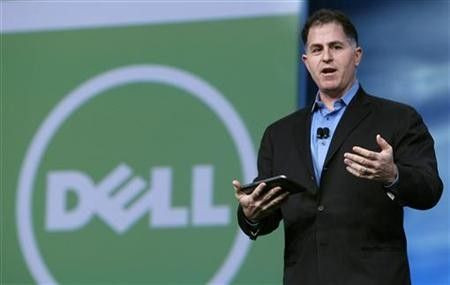Dell Facing Challenge from Tablets, Cloud

Dell Inc. (NASDAQ: DELL) has long-term disadvantages in a tablet and cloud world as Dell is not focused on tablets and is well behind Hewlett-Packard Co. (NYSE: HPQ) in developing a full cloud stack, Jefferies said in a note to clients.
We believe tablets are cannibalizing consumer notebooks and are the biggest driver in the deterioration in Dell’s consumer notebook shipments. We see cloud based services as increasing the velocity of change within the technology sector forcing more rapid innovation and deployments, said Peter Misek, an analyst at Jefferies.
Despite near-term benefits from falling PC component prices and the enterprise PC refresh cycle, we believe Dell has longer-term disadvantages in a tablet and cloud world. In contrast to HP, we see Dell’s 3-year forward margins below where they are today, Misek added.
Misek said Dell is significantly behind HP in investing in a full stack for the cloud with holes primarily in software and networking. HP is stronger than Dell in software, but he thinks HP could make a large software acquisition to buttress that area.
In recent years, HP has spent $6.7 billion on software acquisitions while Dell has only spent $150 million. Without vertical integration, Dell will be dependent on partners who may have differing release and innovation schedules.
Misek said his 2011 industry forecast for branded PC shipments is up 2 percent, at the low end of consensus growth of 2 percent to 4 percent. He expects tablets to cannibalize more enterprise notebooks as getting into 2012.
Misek believes Dell lowered consumer PC research and development (R&D) at a time when the consumerization of technology within the enterprise is taking off. Additionally, Dell will be mostly reliant on original design manufacturer (ODM) partners for tablet and device innovation, causing a potential gaping hole in the portfolio.
Dell is moving quite slowly into tablets after a few new product failures the last few years (e.g., smartphones, Dell Streak). On the hardware side, Dell’s reliance on ODMs makes it unlikely to have a compelling form factor before 2012 and will make it difficult for the company to differentiate, Misek said.
On the software side, Dell will likely support Android and Windows. Not having its own operating system saves on R&D but also contributes toward a lack of differentiation and hampers margin potential going forward, Misek noted.
He said cloud is a challenge for servers and services. Cloud build-outs should help near-term server shipments but could hurt in longer term as utilization rates improve. He views consumer cloud services as this decade’s new iTunes and enterprise cloud services as the next iteration of IT outsourcing.
Consumer cloud services: Misek expects these to launch first as consumers have fewer data security fears than corporations. He expects companies that offer these services to run their cloud services at close to break-even in order to drive scale and use them as the centerpiece of an ecosystem. Monetization will take place via device and application sales.
Enterprise cloud services: Misek expects these initially to be ad-hoc development environments, small chunks (e.g., Microsoft Exchange email servers), and then to ramp over time with a portion on internal private clouds and a portion on third-party public clouds.
Dell will be more focused on small and medium business (SMB) cloud services than on enterprise. HP is one of the few companies well positioned to provide consumer, enterprise, and SMB cloud services, Misek said.
Misek believes Dell is currently building large data centers to offer enterprise cloud services focused on the SMB market, positioning them in direct competition with Salesforce.com. That investment will be a headwind to near-term margins. The capital spending will not impact P&L immediately but he sees some issues with resource allocation.
Also, other companies that hope to generate revenue from cloud services (e.g., Google Inc., Apple Inc., Facebook, etc.) will generally not use Dell equipment as they have enough in-house technical expertise to construct data centers using cheaper ODM hardware and then integrate it themselves, Misek said.
We believe Dell will benefit from enterprise cloud services, but that some of this gain will come at the expense of its IT outsourcing business. In addition, Dell needs to retool its services organization from a sales and product perspective to focus more on cloud services and higher value add, said Misek.
Misek expects Dell’s near-term business to have upside potential due to the enterprise PC refresh cycle and a favorable component environment.
However in longer-term, Misek believes, Dell will be hurt by tablet cannibalization and cloud services could disintermediate its outsourcing business while its weakness in software management tools may hinder its participation in cloud build-outs. While he sees near-term upside, he remains cautious on the long-term.
© Copyright IBTimes 2024. All rights reserved.




















